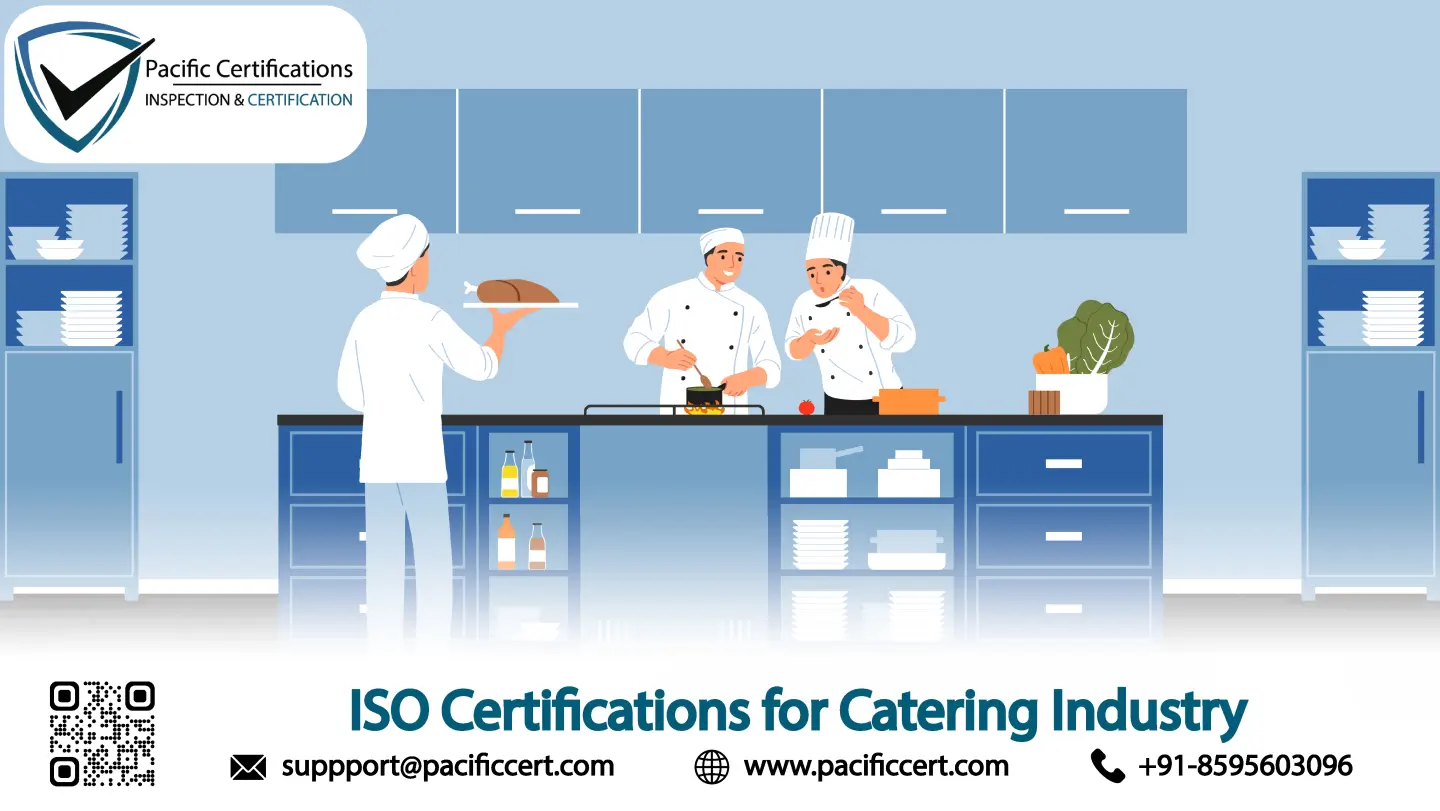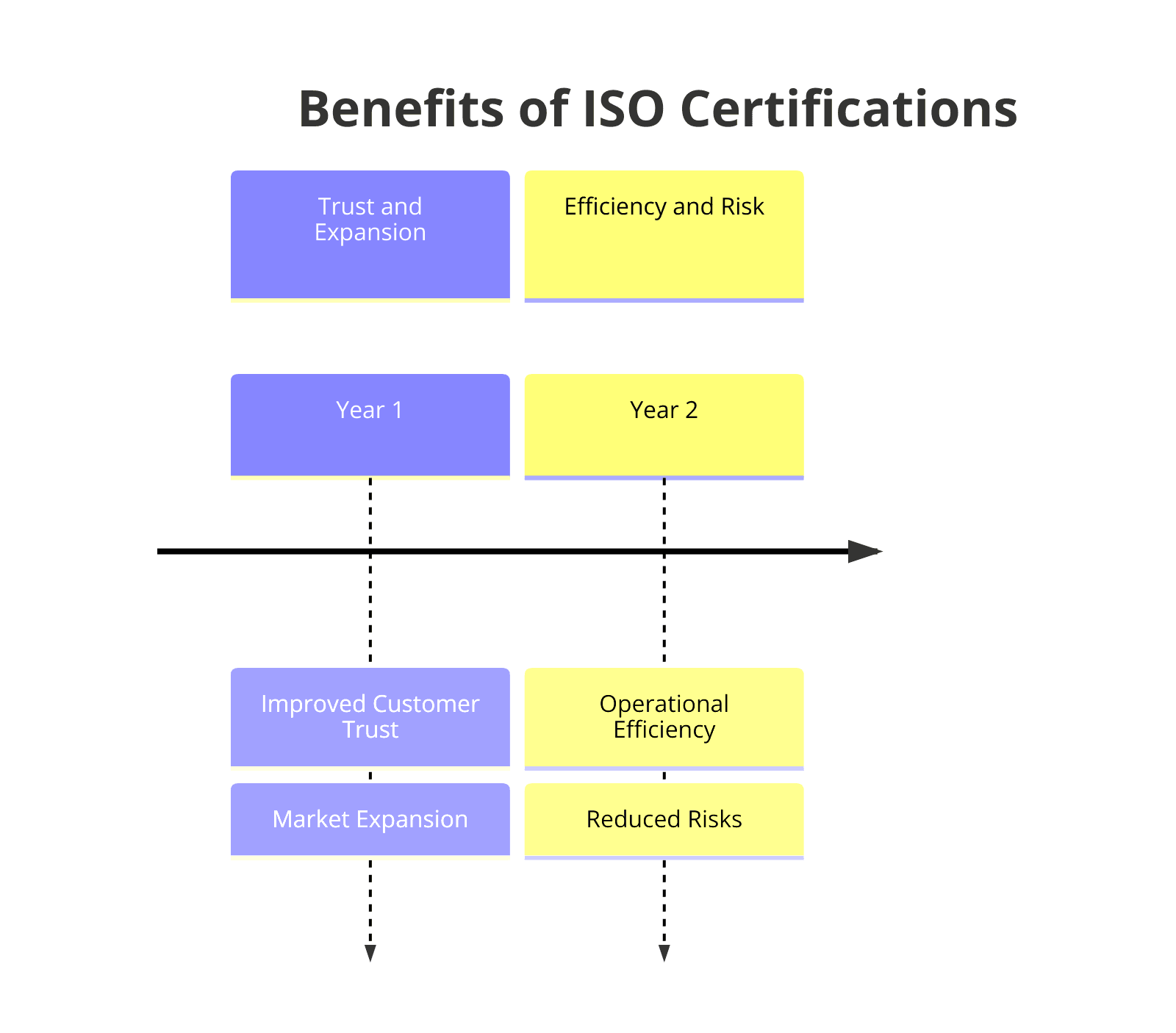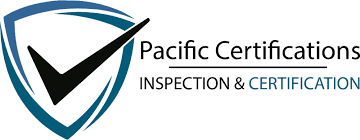ISO Certifications for Catering Industry, Requirements and Benefits

Introduction
The catering industry plays a vital role in events, corporate functions, healthcare, and institutional food services. It is a sector where quality, safety, and timing matter as much as the menu itself. According to global market research, the catering services industry is expected to cross USD 516 billion by 2030, driven by corporate events, weddings, and rising demand for large-scale food delivery. At the same time, businesses in this sector face increasing expectations for food safety, environmental responsibility, and consistent service delivery.
ISO certifications give catering companies structured systems to manage risks, comply with food safety requirements, and meet customer expectations. They also help companies strengthen credibility with corporate clients and government institutions where compliance with standards is often a condition of contracts.
Catering businesses succeed when they can combine food safety, service quality, and trust. ISO certifications provide the framework to achieve this consistently.
Quick summary
ISO certifications help catering companies improve food safety, customer service, and sustainability. Key standards include ISO 22000 (food safety), ISO 9001 (quality), and ISO 14001 (environment). Certification supports compliance, builds client trust, and strengthens access to larger contracts.
Contact us at [email protected] to get your catering business certified!
Applicable ISO Standards for Catering Industry
In the catering service industry, several ISO standards can be relevant to ensure the quality, food safety, and other factors. Here are some of the key ISO standards applicable to the catering service industry:
ISO 22000: Food Safety Management System (FSMS)
ISO 22000 is a globally recognized standard for food safety management systems. It helps catering companies to ensure the safety of food products throughout the supply chain, from procurement to delivery.
ISO 9001: Quality Management System (QMS)
ISO 9001 focuses on quality management across all aspects of your catering service. It helps you establish a systematic approach to meet customer requirements, improve processes, and continually enhance customer satisfaction.
ISO 14001: Environmental Management System (EMS)
ISO 14001 is relevant for catering services that want to minimize their environmental impact. It provides a framework to identify and manage environmental aspects such as waste reduction and energy efficiency.
ISO 45001: Occupational Health and Safety Management System (OHSMS)
Catering businesses need to prioritize the health and safety of their employees. ISO 45001 helps in establishing safety procedures and ensuring compliance with occupational health and safety regulations.
ISO 27001: Information Security Management System (ISMS)
If your catering service handles sensitive customer data, ISO 27001 can help protect that information. It covers the management of information security risks and safeguards.
ISO 50001: Energy Management System (EnMS)
This standard is useful for catering businesses, looking to manage energy consumption efficiently and reduce energy costs. ISO 50001 provides a systematic approach to energy management.
HACCP (Hazard Analysis and Critical Control Points)
HACCP is a part of ISO 22000 & is crucial in the catering industry for identifying and controlling food safety hazards. It's often a prerequisite for ISO 22000 certification.
GMP (Good Manufacturing Practices)
GMP standards are relevant for catering businesses involved in food production. GMP ensures that food is consistently produced and controlled according to quality standards.
At Pacific Certifications, we can guide you through the certification process, contact us at [email protected]
What are the requirements of ISO Certifications for Catering Industry?
Below are the mandatory requirements for implementing ISO standards for Catering Industry:

ISO 22000 - Food Safety Management System (FSMS) Requirements
Implement a food safety management system.
Conduct hazard analysis and establish control measures.
Maintain and document records of food safety processes.
Regularly review and update the FSMS.
ISO 9001 - Quality Management System (QMS) Requirements
Develop a quality policy and objectives.
Establish documented procedures and processes.
Monitor customer satisfaction and address complaints.
Continually improve the QMS.
ISO 14001 - Environmental Management System (EMS) Requirements
Identify and assess environmental aspects and impacts.
Set environmental objectives and targets.
Develop an environmental management program.
Monitor and measure environmental performance.
ISO 45001 - Occupational Health and Safety Management System (OHSMS) Requirements
Establish an OH&S policy and objectives.
Identify hazards and assess risks.
Implement controls and emergency response procedures.
Continuously monitor and improve OH&S performance.
General requirements:
Food Safety Policy: Establish clear hygiene and safety policies aligned with ISO 22000 and regulatory standards.
Hazard Analysis & HACCP Implementation: Identify and control biological, chemical, and physical hazards throughout food preparation and transport.
Process Documentation: Maintain documented procedures for food storage, transportation, and on-site service.
Supplier Evaluation: Approve and monitor suppliers of raw materials to ensure compliance with safety standards.
Employee Hygiene Training: Conduct regular training on personal hygiene, cross-contamination prevention, and equipment cleaning.
Temperature Control & Monitoring: Implement systems to monitor food storage and delivery temperatures.
Cleaning & Sanitization Plans: Establish cleaning schedules and disinfection protocols for kitchens and utensils.
Customer Communication: Document methods for handling complaints, feedback, and service evaluations.
Waste Management: Ensure proper disposal and segregation of food waste and packaging materials.
Internal Audits: Conduct audits to verify compliance with ISO clauses and national food laws.
Management Review: Evaluate food safety, service performance, and client satisfaction regularly.
Legal & Regulatory Compliance: Follow national food safety acts, labor laws, and waste disposal regulations.
Emergency Preparedness: Develop plans for power outages, supply chain delays, or contamination incidents.
Tip: Start with ISO 22000 and HACCP for food safety, then expand into ISO 9001 for service quality and ISO 14001 for environmental responsibility.
What are the benefits of ISO Certifications for Catering Services?
Certification builds trust with clients, improves compliance, and makes catering operations more resilient. Below are some key benefits:

Safer food preparation and handling, lowering the risk of contamination.
Consistent service quality that improves customer confidence.
Compliance with food safety regulations and industry expectations.
Safer working environments for kitchen and service staff.
Reduced waste and energy costs through environmental and energy management.
Easier access to contracts where certified suppliers are required.
Stronger reputation with corporate, government, and institutional clients.
A culture of continuous improvement that supports long-term growth.
The catering industry is witnessing strong growth in corporate, healthcare, and airline catering, with increasing focus on food safety and eco-friendly practices. Fortune Business Insights (2024) projects that ISO 22000 adoption in the catering sector will grow by over 40% by 2030, driven by stricter compliance norms and rising consumer expectations.
Sustainable operations are now a top priority, caterers adopting ISO 14001 and 50001 report 20–25% reductions in energy and waste costs, while ISO 45001 has contributed to a 35% drop in workplace incidents.
ISO-certified caterers are also more likely to win long-term contracts with multinational clients, airlines, and institutional kitchens due to verified compliance and consistent performance.
How Pacific Certifications Can Help
Pacific Certifications, accredited by ABIS, provides independent audit and certification services for catering and hospitality businesses.
Pacific Certifications can help by:
Conducting audits for ISO 22000, 9001, 14001, 45001, and 50001.
Issuing globally recognized ISO certificates for catering companies and event food service providers.
Supporting integrated management system certification across multi-site catering operations.
If you need more support with ISO certification for your catering business, contact us at +91-8595603096 or [email protected].
Ready to get ISO certified?
Contact Pacific Certifications to begin your certification journey today!
Author: Ashish
Suggested Certifications:
Read more: Pacific Blogs

